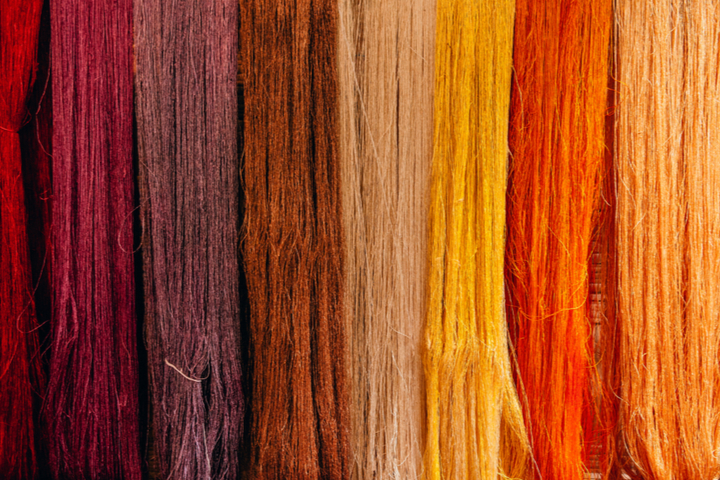Textile Industries are Making a Positive Shift Toward Organic Dyes

25 Apr
2022
The stringent regulations in textiles and garments enforced by countries concerned about the environment and human health are reigniting interest in the use of organic dyes in textile dyeing. Following the market trend, participants are investing in R&D activities to develop superior sustainable alternatives and improve current natural dyes to replace hazardous colors used in the textile industry. According to Allied Market Research, the global organic dyes market is anticipated to grow at a significant CAGR of 5.8% from 2020 to 2027.
Leading companies are launching new collections made with organic dyes, thus giving a sustainable twist to their range of offerings. A denim giant, Levi's recently unveiled its Fresh and vibrant range of denim, tees, and sweatshirts for men, women, and unisex. This latest colorful collection is color-washed with natural dyes derived from plants and botanicals. In addition, Levi's collaborated with mills that implement reverse osmosis on special water-recycling machinery to save water during production.
The collection is inspired by fresh produce, Levi's style series from the 1970s. And, as nature seldom goes out of style, Levi's opted to bring this style back, although with a modern twist of the 21st century. All of the pieces are highlighted with distinctive tabs portraying various fruits and vegetables. The range demonstrates the recent improvements in the denim industry with natural dyes. Despite the fact that natural dyes are generally associated with earth tones, Levi's used novel dying techniques to create vivid colors of peach, pink, lavender, and yellow. All of the dyes in the series have at least 50% mineral or plant content.
Textile dyeing is indeed a very harmful practice for the environment. This offers lucrative opportunities for market players to provide a sustainable alternative. New entrants are entering the market with innovative and environment-friendly textile dyeing alternatives. Nienke Hoogvliet, a Dutch designer, has partnered with Anne Boermans, an entrepreneur, to develop Zeefier, a company that will provide natural textile dyes made exclusively from seaweed. The founder of Studio Nienke Hoogvliet has devoted the last eight years to experimenting with different varieties of seaweed to develop distinct color dyes. Zeefier is rapidly expanding manufacturing of these dyes for commercial usage, providing an alternative to the multi-chemical artificial colorants commonly used in the fashion sector.
Last year, Zeefier had officially introduced during the Dutch Design Week in Eindhoven, where Hoogvliet and Boermans demonstrated a variety of colors that can be manufactured with seaweed dye. The scientists at Zeefier have been striving to transform this complete color spectrum into dyes that can be mass-produced and used in the design and fashion industries.
The outbreak of the Covid-19 pandemic had a substantial effect on the organic dyes market, owing to the global lockdown regulations and travel limitations. In addition, the pandemic has resulted in the partial or complete closure of non-essential products production facilities. However, as the world is getting back to normalcy, the global organic dyes market is anticipated to revive

Koyel Ghosh
Author’s Bio- Koyel Ghosh is a blogger with a strong passion and enjoys writing in miscellaneous domains, as she believes it lets her explore a wide variety of niches. She has an innate interest in creativity and enjoys experimenting with different writing styles. A writer who never stops imagining, she has been serving the corporate industry for the last five years.
Avenue: Entire Library membership of Allied Market Research Reports at your disposal
- Avenue is an innovative subscription-based online report database.
- Avail an online access to the entire library of syndicated reports on more than 2,000 niche industries and company profiles on more than 12,000 firms across 11 domains.
- A cost-effective model tailored for entrepreneurs, investors, and students & researchers at universities.
- Request customizations, suggest new reports, and avail analyst support as per your requirements.
- Get an access to the library of reports at any time from any device and anywhere.
Related Post
-
How are Submarine Cables Transforming Global Connectivity with Enhanced User Experience?
-
Endoscopy Procedures: Transformations in Techniques and Applications
-
AI-Powered Video Analytics: How the Product Actually Works for enterprises
-
Painting Robots: Transforming Precision Coating and Creative Applications
-
Innovations in Pharmacovigilance Systems Advancing Patient Safety
-
Understanding Edge Security: Keeping Data Safe Near the Source
-
Exploring the Use and Advancements of 3D Laser Scanners in Professional Applications
-
Reinforcing Industrial Controls with Smarter Tools and Training








